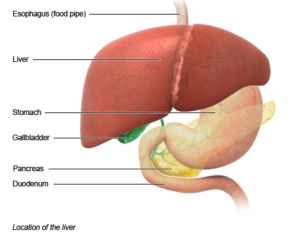Hepatitis is an inflammation disease that affects the liver and can cause a lot of damage to the liver. The liver is the largest internal organ in the body. The job of the liver is to convert the nutrients we feed it into substances that our body can use to live well. The liver is located at the right upper abdomen.
The function of the liver:
- Makes the bile that helps you digest your food
- Filters the toxins from the body
- Makes bilirubin that is a product of broken down red blood cells, hormones, cholesterol, and drugs
- Breaks down carbs, fats, and proteins
- It activates an enzyme that are specialized proteins that helps the body function
- It stores glycogen which is sugar, minerals, and vitamins A, D, E, and K
- It makes Albumin which is protein in the blood
- It helps with clotting in the blood
That being said, having any of the five different forms of hepatitis can damage that function and make living well a challenge.

The five different types of hepatitis are:
- Hepatitis A: This is the HAV virus and it can be transmitted by consuming food and water that are contaminated by feces
- Hepatitis B: Can be transmitted through contact with infectious body fluids, blood, vagina secretions, and semen
- Hepatitis C: HCV Virus, can be transmitted by body fluids, drug use, and sexual contact. There are 2.7 to 3.9 million Americans who have Hep C.
- Hepatitis D: HDV virus can be transmitted through blood. This is a rare form of hepatitis.
- Hepatitis E: This virus can be transmitted through water. There are many poor countries that have bad sanitation conditions and that is where this virus affects the people the most. Mainly areas in the Middle East, Asia, Africa, and Central America.
The symptoms of hepatitis include:
- Loss of appetite
- Nausea and vomiting
- Diarrhea
- Dark colored urine
- Stomach pain
- Jaundice
If you have any of these forms of hepatitis don’t worry you can still live well anyway.
Tips in how to live will with hepatitis:
- Get help with sobriety, no alcohol, drugs, or smoking. It is tough but there are some wonderful programs that will help.
- Get your vaccinations and encourage your family and friends and kids to them too.
- Exercise: this might be hard because of energy or pain levels, even breaking it down to five minutes will help your body move those toxins in your body.
- Seek support for your emotional well-being. Sometimes we are so focus on our physical we forget about emotional and mental well-being. There are some great support groups or even counselors that can help you.
- Practice safe sex
- Cover your wounds and cuts
- Ask about an antiviral drug therapies that may help you.
- Educate yourself
- Learn about acceptance
- Reduce the stress in your life
- Eat well, reduce red meat, reduce saturated fats, cut back on simple carbs, eat more whole grains, vegetables, and drink a lot of water.
Taking care of yourself is hard when you are faced with an virus that will not be healed, but you can live well anyway. Karen G Clemenson and the Wellness Works NW Team would be more than happy to help you on your journey to living well and fight back.
Here are some links I would like to share with you:
- 7 Tips for Living Well with Hepatitis by Sheba Medical Center Staff
- Coping With Hepatitis by James Myhre & Dennis Sifris, MD and medically reviewed by Priyanka Chugh, MD for VeryWell Health
- Hepatitis by Aril Kahn for Healthline
- Hepatitis by Medline Plus Staff
- Hepatitis by WebMD Staff
- How does the liver work? by NCBI Staff
- Living Well by Hepatitis Victoria Staff
Related Articles
 Jamie Holloway is a co-owner of Wellness Works NW and she is also our Research Manager and writes our Chasing Wellness with Jamie Holloway and Dear Jamie columns. Jamie is also an Independent Wellness Advocate at dōTERRA. She lives in the Portland, Oregon area. Since October 2011 she has been sharing her Journey Toward Health and Wellness with Vasculitis through her blog at JamieChasesButterflies.com. We hope you are as inspired as we are with the raw candor Jamie uses in her writing. If you would like to help support Jamie’s writing efforts please Donate now.
Jamie Holloway is a co-owner of Wellness Works NW and she is also our Research Manager and writes our Chasing Wellness with Jamie Holloway and Dear Jamie columns. Jamie is also an Independent Wellness Advocate at dōTERRA. She lives in the Portland, Oregon area. Since October 2011 she has been sharing her Journey Toward Health and Wellness with Vasculitis through her blog at JamieChasesButterflies.com. We hope you are as inspired as we are with the raw candor Jamie uses in her writing. If you would like to help support Jamie’s writing efforts please Donate now.













